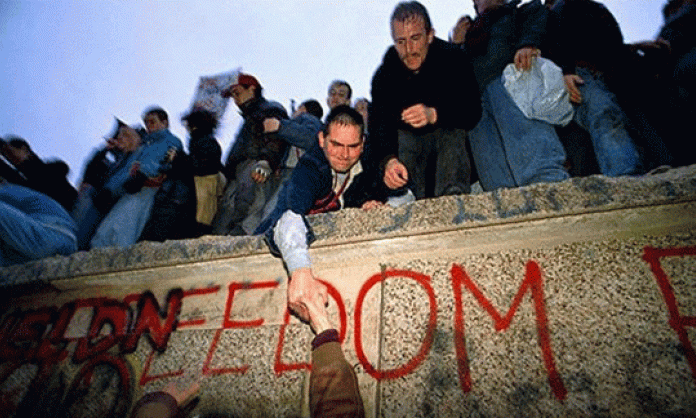The scenes of people chipping away at the Berlin Wall are still as thrilling today as when I watched them 25 years ago. But the hypocritical glee of the Western media and politicians was nauseating.
One social scientist declared “the end of history”, while economists blathered about the virtues of the market. Warmongers and class warriors intent on destroying workers’ organisations and cutting living standards in the West declared their support for the fight for freedom in the East.
One of the first acts in the Berlin Wall drama said a lot. When East German border police turned water hoses on West Germans dancing on the wall, they in turn were showered with champagne. As they hesitated, West German riot squads attacked the dancers.
This was not an isolated event. Millions were rising, challenging murderous tormentors across the Stalinist bloc. A gathering storm threatened the USSR – from Armenia and Azerbaijan a year earlier to Latvia in early 1989. The Karabakh region was under military rule, and the Ukrainian national movement faced similar threats.
In April tens of thousands had protested in Tbilisi, Georgia, bearing placards which summed up the mood sweeping the bloc: “Down with the decaying Soviet Empire.” Russian troops killed 19, injured or poisoned hundreds with batons and nerve gas. In response, president Gorbachev declared his resolve to resist “extremism, anti-Soviet displays and destructive actions of adventurist elements”.
In August, 100,000 coal miners set up strike committees in Siberia. One of the leaders declared: “This is our revolution from below.” They added to their economic demands agitation for three years’ maternity leave on full pay and a 60 percent pay rise for women working in dangerous conditions. Whole towns were under workers’ control; thousands debated in the squares all day long.
Within weeks of the Wall coming down, tens of thousands confronted tanks in Romania, and on Christmas day the execution of the hated dictator Nicolae Ceausescu and his wife was televised. Organised workers played a key role in toppling the regime in Czechoslovakia.
By 1991, 400 million people had toppled dictators and smashed the secret police. Committees formed in the Romanian revolution stopped the export of food and coal so they could be used to feed and warm the poor; coffee appeared in the shops for the first time in 10 years!
Some politicians in the West sensed the dangers to themselves if workers in the East actually won freedom. Margaret Thatcher warned that “the very speed of change could put the goal of democracy in jeopardy”.
Tragically, the radicals who put themselves at the head of the masses limited their goals to joining the “free market”. But rather than the freedom trumpeted by the West, a massive restructuring of a significant part of the world system was carried out. Everywhere, under pressure from the World Bank and IMF, new governments implemented neoliberal attacks. The freedom lovers bayed for profits. The US ambassador to Austria intoned: “Before the luxury [!] of humanising the system, there will be cruel changes.” Citizens of Czechoslovakia were told to take a 25 percent cut in living standards.
Profitable enterprises were sold to Western investors – or former Stalinist bureaucrats simply took them over. The rest were left to collapse. One group of economists described the next few years in Eastern Europe as “a great depression … virtually without historic precedent”.
Solidarnosc in Poland presided over food price rises of up to 600 percent while it froze wages. In 1991, East German industrial output halved. One year after the wall fell, a notice on the door of a Leipzig church read “with 2,000,000 unemployed we see little cause for celebrating”.
In the Caucasus, GDP per capita halved in two years. Life expectancy fell in many areas. In 1995 male life expectancy in Russia was 58 years. Romania’s population declined by 12 percent as those who could escaped. It remains the EU’s second poorest state. Inequality has grown steadily in most of the old bloc. In 1990 the highest paid in Russia earned four times the average; today they earn a minimum of 17 times more.
For decades, the West had called for the iron curtain to be torn down. Now they set about ensuring it remained intact – under new terms that whipped up anti-immigrant fear and loathing. The Council of Europe reported that “Western countries [are] disturbed – in some cases terrified – by the prospect of migration from … the former Eastern Bloc.” Italian and Austrian troops were mobilised to counter the “threat” from Roma, perceived as the most dangerous.
So the freedom that was promised – if only those overthrowing the Stalinist order embraced the market – turned into a nightmare.
Rabid racism abounds across Europe today. Ethnic cleansing in the Balkans and the bombing of Serbia by NATO in the late 1990s, catastrophic cuts in living standards across most of the former Eastern bloc, repressive rule in many states have all led to profound alienation. Fascists are some of the best organised in Hungary.
The fall of the Berlin Wall symbolises the core of the Marxist argument: that masses of workers, the poor and students can and will challenge class rule. Their uprisings are moments of joy, inspiration and hope. The masses of the Stalinist bloc proved it was not communism, but also that the free market cannot serve the interests of humanity.
Those who struggled to bring Stalinism to its knees should be honoured for illuminating these historic truths.





